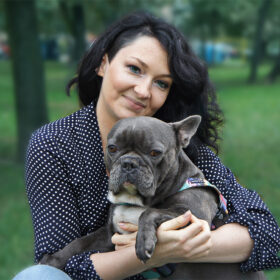The phenomenon of figurines and pictures depicting a Jewish man with a gold coin dates back to the beginning of the 20th century. People are buying them because of the belief—rooted in a much older, antisemitic stereotype linking Jewishness with wealth; that such an image will bring financial success. The instructions for using the pictures read: “the picture should be hung near the front door and turned upside down at the end of each week so that all the money the Jew has attracted to himself falls out of his pocket.”
In 2014, the mass phenomenon of the selling and purchasing pictures, mugs and other gadgets became the subject of scholarly reflection of anthropologist Erica Lehrer, who, in her book entitled Lucky Jews wonders how we should treat these artifacts: as souvenirs, talismans, or maybe regular toys? Do the Jews presented in this stereotypical way function as ghosts of the Holocaust or patrons of the Polish version of capitalism? How much of can be understood as philosemitic longing for absent neighbors and how much as antisemitic clichés?
These issues are addressed by FestivALT’s most popular and at the same time most controversial, satirical-critical project, Lucky Jew, initiated in 2017. Lucky Jew was conceptualized by Michael Rubenfeld and implemented with Magda Rubenfeld Koralewska, Jason Francisco and Adam Schorin. It was a series of performances, where Rubenfeld, and later Schorin took on the role of a real “Lucky Jew”, selling canvases, magnets, mugs, puzzles, phone cases, and more with their image holding a coin. Intrigued passers-by are being encouraged to purchase an item “for luck”, while simultaneously taking part in a horizon-expanding, perspective-changing conversation about stereotypes, traditions and the nature of happiness,
The artistic and activist initiative attracted media attention from all over the world, including: “Wysokie Obcasy” i “Magazyn Kontakt”, “VICE Magazine”, “The Times of Israel” and “Jewish Rhode Island”. In Poland, it was commented on by such authority figures as Agnieszka Graff and Konstanty Gebert. Called antisemitic and/or anti-Polish, brilliant and stupid, the performance received wide attention in many circles. Because of the Lucky Jew project, critical reflection on the impact of local folklore and Polish-Jewish relations appeared in new contexts that it had been lacking on the streets of Kazimierz, crowded with tourists, or at the very popular Emaus Easter fair.
In 2020, the Mayor of Krakow stated that “Images of Jews, along with their symbolic meaning, are closely related to local traditions and beliefs. […] jovial, friendly [Jewish] old people evoke warm feelings, being associated primarily with resourcefulness and diligence. […] The city is committed […] to maintaining this long, secular tradition […].” In response to his statement, FestivALT established an activist-expert working group, which included both organizations (Jewish Association Czulent, Autonomia Foundation) and specific individuals (prof. Erica Lehrer). The aim of the group was to develop a scenario of systemic and symbolic actions that would permanently modify the attitude towards the problematic “tradition.”
In November 2020, in cooperation with Robert Piaskowski, Plenipotentiary to the Mayor of Krakow for Culture and prof. Dominika Kasprowicz, director of the Villa Decius Institute of Culture, a series of round table meetings was organized. Any from across Poland, representing Jewish and non-Jewish communities, participated, resulting in the creation of an advisory body for the Jewish heritage of Krakow. The group presented its recommendations to the City in September 2021.
In addition, an open letter, signed by nearly sixty representatives of the most important local institutions, was drafted and publically issued As a result, in only one year after President Majchrowski’s problematic statement, the city authorities managed to sensitize themselves to antisemitic accents in public space and change not only the understanding of “folklore” or “tradition,” but also the applicable legal regulations. Krakow became the first Polish city to take an official position on the problematic phenomenon of the “Lucky Jew,” banning the sale of these types of images in places subsidized by the city.
The originator of the performance, Michael Rubenfeld, also commented on the matter, updating it and adapting it to the realities of the year 2023:
Read also:
- Michael Rubenfeld and Adam Schorin discuss the piece with Jenny Friedland on NPR’s Worldview.
- Graham Isidor writes about the performance and includes an interview with the performance for Vice.
- Jason Francisco writes about the first edition of the performance, from 2017;
- Which Jew will give you more happiness? Real or mass-produced? [“Który Żyd da więcej szczęścia? Prawdziwy czy taki z masowej produkcji?”] by Agnieszki Graff for Wysokie Obcasy, August 4, 2018;
- Applied Jew [“Żyd stosowany”] by Bożena Keff for Krytyka Polityczna, April 19, 2018;
- Why does anyone need a “Jew for luck”? [“Po co komu Żyd na szczęście?”] by Natalia Grygna for LoveKraków, April 2o, 2019;
-
28 June 1712:00
“The Lucky Jews” Francisco / Keiser / Lehrer / Rubenfeld – performance
Read more -
26 June 1817:00
“The Lucky Jew is Back” Francisco / Gebert / Rubenfeld – performance
Read more -
18 June 1918:00
Massolit Discussion: Michael Rubenfeld & Adam Schorin
Read more -
23 June 1907:00
“Lucky Jew” Rubenfeld / Schorin – performance
Read more -
26 June 1910:30
“Lucky Jew” Rubenfeld / Schorin – performance
Read more -
26 June 1913:00
Real, Live, Lucky Jews: A Conversation With FestivALT
Read more -
30 June 1907:00
“Lucky Jew” Rubenfeld / Schorin – performance
Read more -
13 April 2013:00
Lucky Jew Live
Read more -
26 November 2020:00
The Lucky Jewathon
Read more -
02 December 2010:00
Webinar: The Luckiest Jew of Poland
Read more -
03 July 2117:30
The future of “The Lucky Jew” in Kraków
Read more -
24 June 2311:00
“The Lucky Jew Shop” Rubenfeld / Pinkosz – exhibition-intervention
Read more





